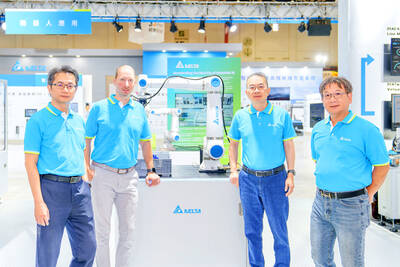Copenhagen Infrastructure Partners (CIP) yesterday urged the government to keep next year’s purchasing price for offshore wind energy at current levels to reflect higher risk hedging costs.
The Ministry of Economic Affairs is expected to publish its proposed offshore wind energy purchase price before the end of this month and finalize its decision in December.
CIP urged the government to maintain this year’s price of NT$5.8 (US$0.19) per kilowatt-hour, as further cuts would stifle the nation’s efforts to create a homegrown industry to harness offshore wind energy, CI Wind Power Development (Taiwan) Co chief financial officer Keith Hsu (徐正穎) said at a media gathering.
A reasonable price would ensure that offshore wind farm developers have enough time to build a local supply chain and meet the government’s renewable energy and local content targets, Hsu said.
CIP last year began risk analysis services on behalf of lenders for insurance company Aon PLC, which revealed that Taiwanese offshore wind power projects have a considerably higher risk compared with similar projects in Europe.
Apart from frequent typhoons and earthquakes, Taiwan also has higher exposure to foreign-exchange volatility as well as elevated geopolitical tension as relations with China sour, Aon chief technical officer Clive Lin (林彥碩) said.
A 300-megawatt project in Taiwan costs between NT$320 million and NT$440 million more than a similar project in Europe, Lin said.
Taiwan also has higher construction fleet rental fees as vessels must sail long distances to work on projects, while the readiness of the local supply chain still remains a concern for investors, he said.
As a result, the government has underestimated the cost of offshore wind projects by neglecting risk hedging provisions, he added.

SETBACK: Apple’s India iPhone push has been disrupted after Foxconn recalled hundreds of Chinese engineers, amid Beijing’s attempts to curb tech transfers Apple Inc assembly partner Hon Hai Precision Industry Co (鴻海精密), also known internationally as Foxconn Technology Group (富士康科技集團), has recalled about 300 Chinese engineers from a factory in India, the latest setback for the iPhone maker’s push to rapidly expand in the country. The extraction of Chinese workers from the factory of Yuzhan Technology (India) Private Ltd, a Hon Hai component unit, in southern Tamil Nadu state, is the second such move in a few months. The company has started flying in Taiwanese engineers to replace staff leaving, people familiar with the matter said, asking not to be named, as the

The prices of gasoline and diesel at domestic fuel stations are to rise NT$0.1 and NT$0.4 per liter this week respectively, after international crude oil prices rose last week, CPC Corp, Taiwan (台灣中油) and Formosa Petrochemical Corp (台塑石化) announced yesterday. Effective today, gasoline prices at CPC and Formosa stations are to rise to NT$27.3, NT$28.8 and NT$30.8 per liter for 92, 95 and 98-octane unleaded gasoline respectively, the companies said in separate statements. The price of premium diesel is to rise to NT$26.2 per liter at CPC stations and NT$26 at Formosa pumps, they said. The announcements came after international crude oil prices

STABLE DEMAND: Delta supplies US clients in the aerospace, defense and machinery segments, and expects second-half sales to be similar to the first half Delta Electronics Inc (台達電) expects its US automation business to remain steady in the second half, with no signs of weakening client demand. With demand from US clients remaining solid, its performance in the second half is expected to be similar to that of the first half, Andy Liu (劉佳容), general manager of the company’s industrial automation business group, said on the sidelines of the Taiwan Automation Intelligence and Robot Show in Taipei on Wednesday. The company earlier reported that revenue from its automation business grew 7 percent year-on-year to NT$27.22 billion (US$889.98 million) in the first half, accounting for 11 percent

A German company is putting used electric vehicle batteries to new use by stacking them into fridge-size units that homes and businesses can use to store their excess solar and wind energy. This week, the company Voltfang — which means “catching volts” — opened its first industrial site in Aachen, Germany, near the Belgian and Dutch borders. With about 100 staff, Voltfang says it is the biggest facility of its kind in Europe in the budding sector of refurbishing lithium-ion batteries. Its CEO David Oudsandji hopes it would help Europe’s biggest economy ween itself off fossil fuels and increasingly rely on climate-friendly renewables. While